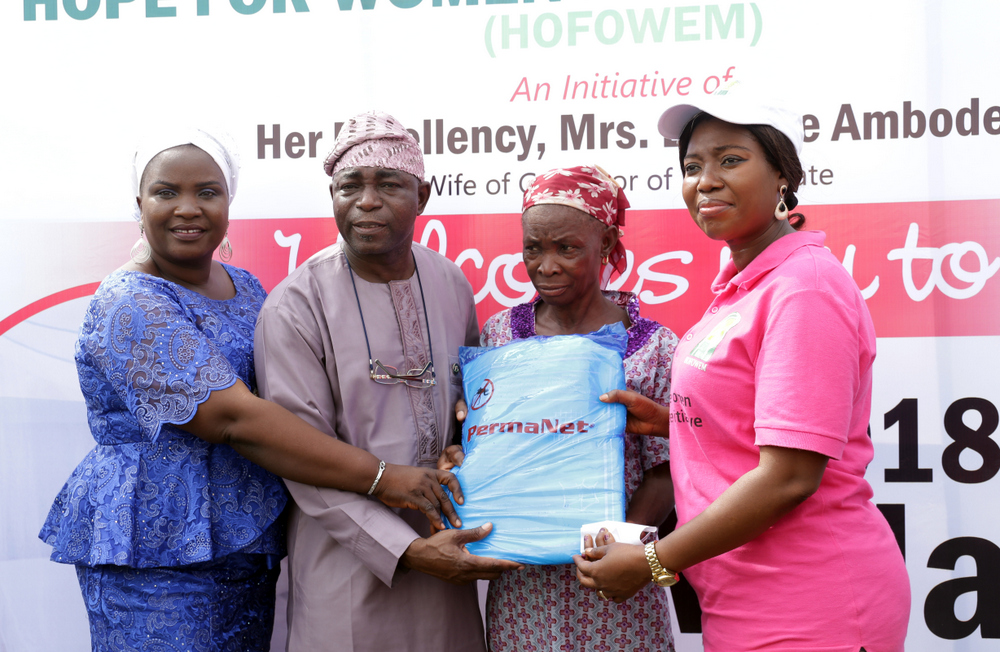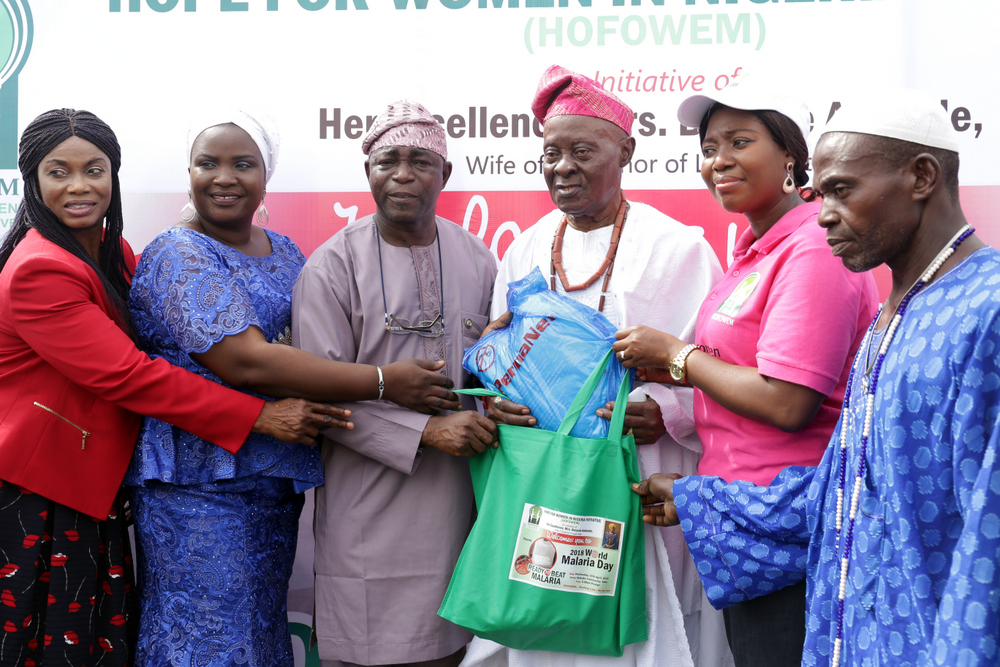Wife of the governor of Lagos State, Mrs. Bolanle Ambode, has urged Lagosians and Nigerians in general, to be more concerned with preventing rather than curing malaria infection.
She gave the charge in Oregun, HOFOWEM office, when her pet project, Hope for Women in Nigeria Initiative HOFOWEM, distributed over 3000 insecticide-treated nets, at Makoko community, Yaba LCDA, as part of activities to mark 2018 World Malaria Day.
Mrs. Ambode described as unacceptable, a situation where a child dies every two minutes from malaria around the world, and an alarming global average of 400,000 deaths annually, according to WHO accounts.

She submitted that efforts should be geared towards a robust prevention of the scourge, with wide-spread use of nets, in-door spraying with insecticide and preventive treatment of expectant mothers.
According to her, ‘We cannot fold our arms and allow malaria to continue to ravage our society. This epidemic has claimed too many lives, whether in our country, Africa or the world in general. Thank God it is not a disease without prevention or cure, and since it has both, the easier way out is to prevent it’.
‘The World Health Organization tells us that more than 400,000 malaria deaths still occur annually, and at least one child dies of the infection every two minutes around the world, this is bad enough. It cannot go on this way, we need to scale down the ugly trend, by doing more to prevent rather than chase after cure.’
She noted further that the theme for this year, ‘End Malaria for Good’ was attainable, if governments, NGOs, stakeholders and individuals, worked together to combat the epidemic.
She specifically appealed for more investment in malaria prevention, as well as greater funding for malaria control in endemic countries, stressing that this would aid the attainment of WHO’s Global Technical Strategy for Malaria projection of 40 per cent reduction in cases and deaths by 2020.
Speaking further, she said, ”HOFOWEM as foundation, is concerned about the welfare and health of the family. The family cannot be productive if it is plagued with one of the fastest killers in medical history. This is why we are advocating for the use of treated insecticide nets, proper disposal of waste and a clean environment generally.”
The governor’s wife expressed happiness at the gradual improvement in public awareness on malaria issue as indicated by people’s warm acceptance of the nets, noting however, that public education and enlightenment must go on and the programme extended to other communities in the state.
Addressing the community members, the chairman of Yaba Local Council Development Area, Hon. Kayode Omiyale, thanked the founder of HOFOWEM foundation, for celebrating 2018 world malaria day with the community and counseled Makoko residents to ensure the insecticide distributed is used for the purpose for which it was given.

He appealed that their environment should be kept clean at all times to avoid breeding mosquitoes, and that personal and community hygiene should be taken as a priority.
Also speaking, the chief executive officer of HOFOWEM, Mrs. Olayinka Oyefunke, thanked the founder for approving the purchase and mass distribution of the nets, stressing that it was in line with HOFOWEM’s philosophy of touching people’s lives.
Speaking on behalf of the beneficiaries, Alhaji Ibraheem Aladetan, the bale of Ilaje-Makoko community thanked the founder of HOFOWEM for her care, promising on behalf of others, that their homes and immediate surroundings would always be kept clean, since mosquitoes breed more in a filthy environment, and that the insecticide net would be used for the purpose for which it was given.
April 25th every year is World Malaria Day, set aside since 2007 to recognize global efforts at controlling malaria, provide education on the scourge and spread information on control strategies in endemic areas across the world.